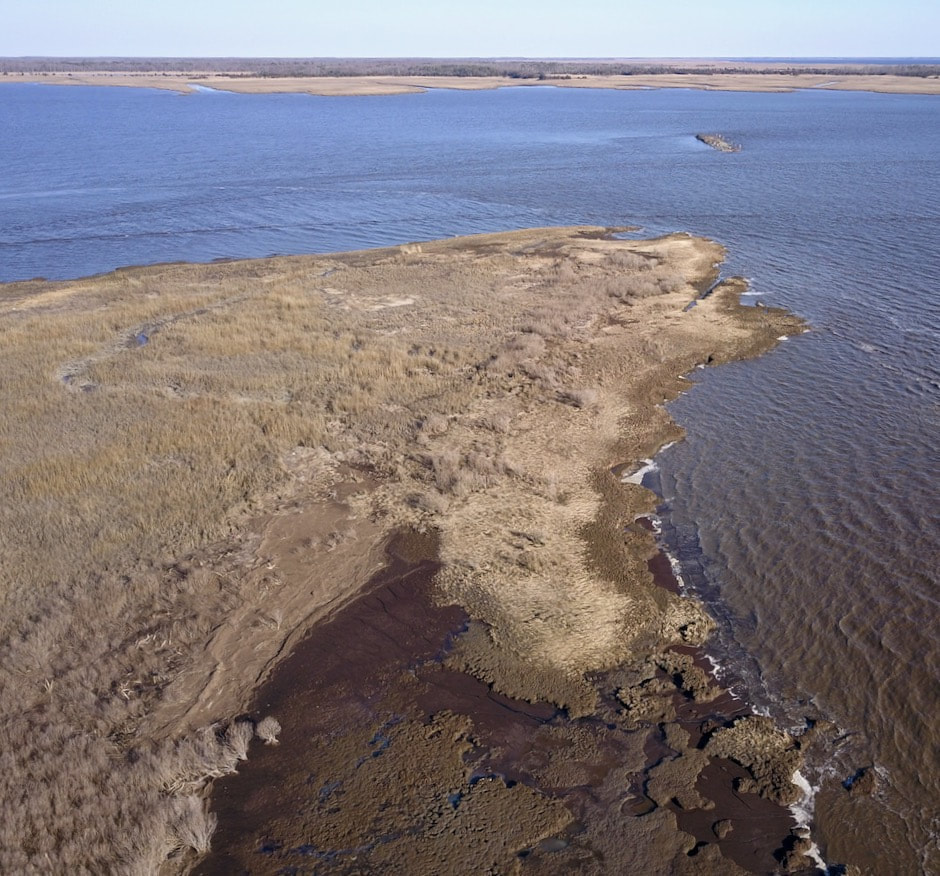|
The project is a partnership between the Littoral Society, Wildlife Restoration Partnerships, and Stockton University, with support from the US Fish and Wildlife Service and the NJ Department of Environmental Protection, Division of Fish and Wildlife.  Basket Flat at the mouth of the Maurice River in southwestern New Jersey. WASHINGTON, D.C., Nov. 17, 2020 – The National Fish and Wildlife Foundation (NFWF) and National Oceanographic and Atmospheric Administration (NOAA) today announced more than $37 million in new grants from the National Coastal Resilience Fund (NCRF) that will support coastal resilience projects in 25 states and U.S. territories. The 46 grants announced today will generate $55 million in matching contributions for a total conservation impact of $92 million. The NCRF grants will contribute to the restoration or enhancement of natural features such as coastal marshes and wetlands, dune and beach systems, oyster and coral reefs, mangroves, forests, coastal rivers and barrier islands. These natural buffers can help reduce the impacts of storms, rising sea levels and other extreme events on nearby communities and habitats. The American Littoral Society, a membership-based coastal conservation organization headquartered in Highlands, New Jersey, was awarded $4.9 million for its proposed work Restoring Ecologically Beneficial and Resilient Infrastructure at the Mouth of Maurice River (NJ). The Littoral Society has been a leader in coastal resiliency, habitat restoration and adapting to climate change impacts for many years. Their work integrates ecological restoration with enhanced resiliency for seaside communities. The Delaware Bay is one of the most important coastal environments in the mid-Atlantic and is the home to bay-related economies built around oysters, fishing, birdwatching and ecotourism. Both its natural resources and its communities are becoming increasingly vulnerable to climate change and storms. The towns, oyster fleet docks and marshes surrounding the Maurice River are among the most vulnerable areas within the bay and have been unprotected for years. The work will create a hybrid living shoreline, hybrid rock revetment, oyster reefs, and ribbed mussel beds at the tip of Basket Flats and at Northwest Reach. These enhancements will protect the inlet of the Maurice River, while also providing resiliency and an ecological boost by protecting marsh and creating new habitat. The project is a partnership between the American Littoral Society, Wildlife Restoration Partnerships, and Stockton University. It is supported by and in collaboration with the United States Fish and Wildlife Service and the NJ Department of Environmental Protection, Division of Fish and Wildlife. “This is a critical project at a critical time” said Tim Dillingham, Executive Director of the American Littoral Society. “The grant from NFWF will enable us to move forward with our plans to enhance the resiliency of these communities and the bay environment. We have built strong partnerships with the communities, elected officials and other stakeholders all of whom are ready to get to work after so many years of increasing vulnerability.” Capt. Al Modjeski, Habitat Restoration Program Director, said: “We are very grateful to NFWF, NOAA, and all the National Coastal Resilience Fund partners for awarding us the funding to improve the resiliency and habitat quality at the mouth of the Maurice River. This has been a long awaited and much needed restoration.” Dr. Larry Niles, of Wildlife Restoration Partnerships, leads the science and planning for the project. “Our project will stabilize a Delaware Bay shoreline around the mouth of the Maurice River that now rapidly erodes from historical and climatic damage while increasing the ecological value of the areas,” Niles said. “We will construct newly designed structures that will create a secure, protected shoreline while improving the shoreline's ecological value for fish, shellfish, birds, and horseshoe crabs.” “Getting this project ready to become a reality took a lot of effort from many concerned stakeholders,” Dillingham said. “We are grateful to all the town officials, Congressional offices and other partners for their support. We are elated that there is such strong consensus to get this work done.” The work on this project is scheduled to begin early in 2021. Dillingham also thanked NFWF for creating the overall National Coastal Resilience Fund program. "Rising sea levels and climate change are threatening coastal areas that have already been damaged by development and pollution,” he said. “These projects will help protect and restore shorelines, ensure that underserved communities are stronger and able to bounce back more quickly after natural disasters, and enhance the unique ecology of the New Jersey's Delaware Bayshore for the environmental and economic benefit of all the region's inhabitants.” ### Leaders in coastal conservation since 1961, the American Littoral Society, a 501 (c)3 non-profit organization, promotes the study and conservation of marine life and habitat, protects the coast from harm, and empowers others to do the same.
Wildlife Restoration Partnerships seeks to restore wildlife and their habitat while improving coastal resiliency in partnership with conservation nonprofits, natural resource agencies, and local governments. Comments are closed.
|
Archives
July 2024
Categories
All
|

